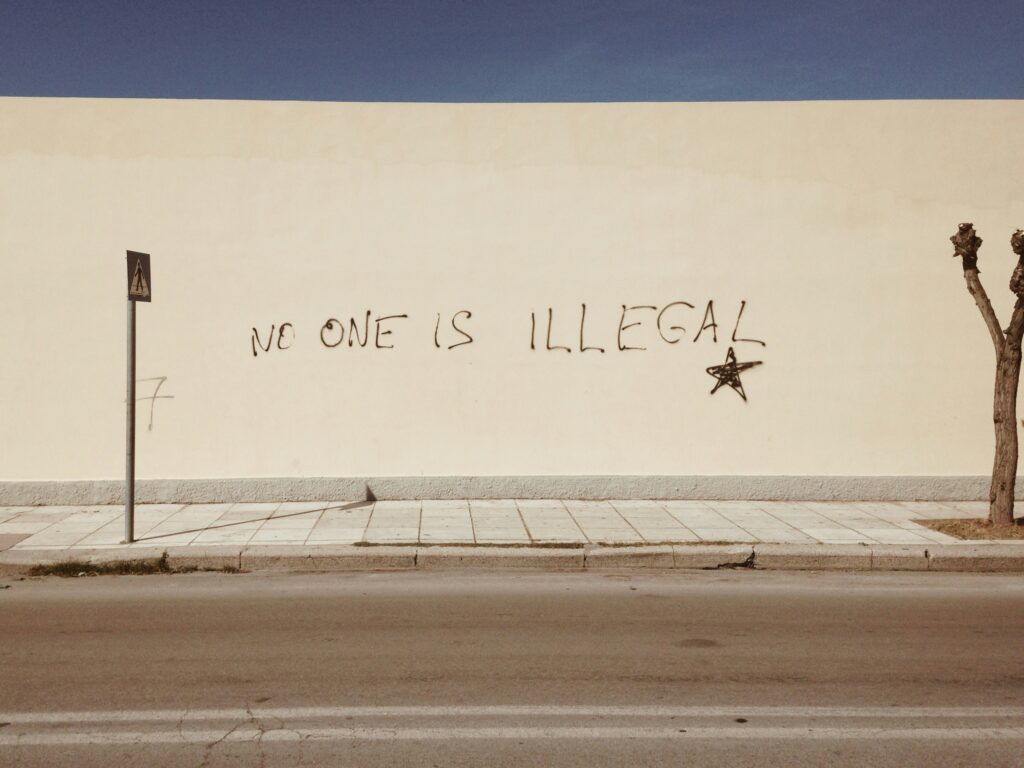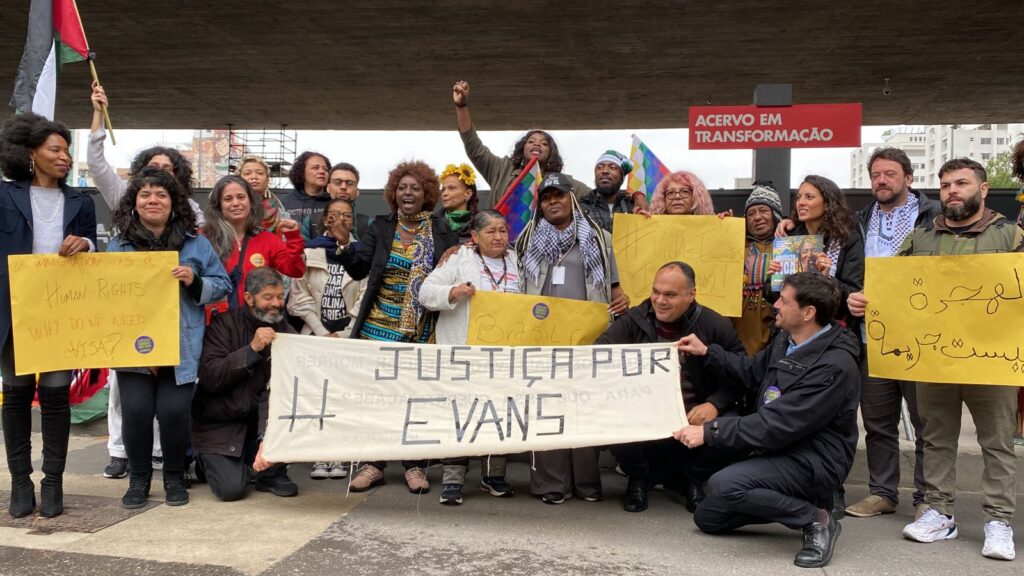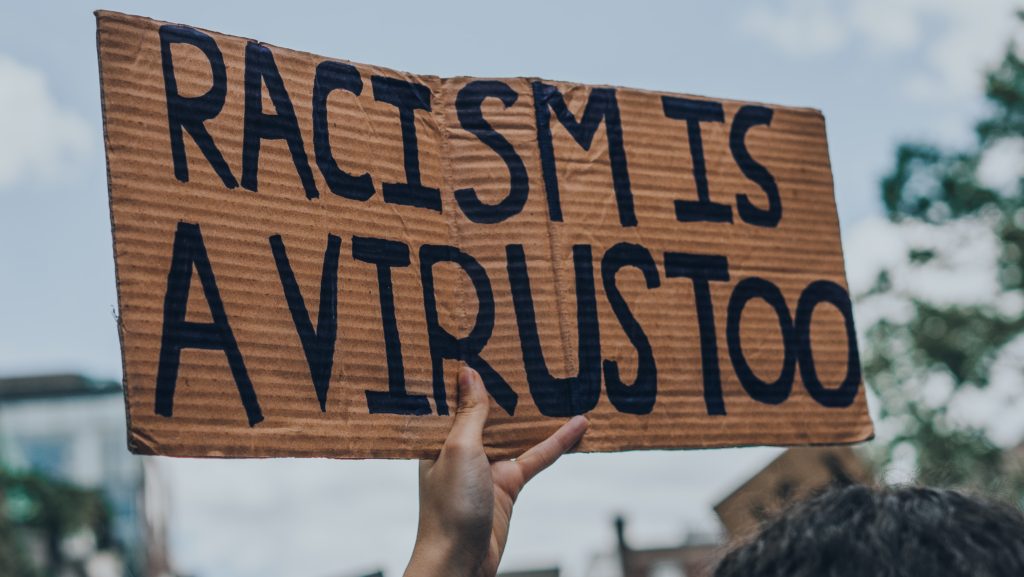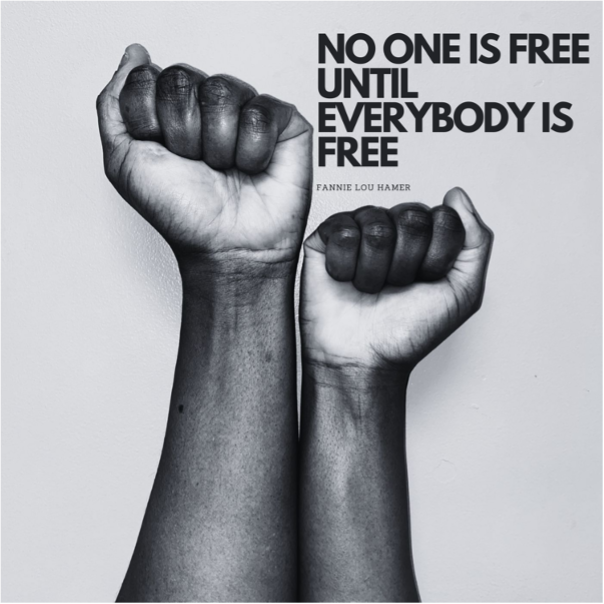Amid rising anti-immigration rhetoric and restrictive policies fueled by the media in Brazil, activists are calling for justice for Evans Osei Wusu. His death reveals the deep-rooted systemic discrimination faced by migrants. Hiordana Bustamante explores the urgent demand for justice, reparations, and accountability to safeguard migrant rights and promote meaningful change.
✍🏾 Hiordana Bustamante/Translation: Nathália Urban
📷 Black Immigrant Lives Matter Network
On Sunday, August 25th, despite the rain and strong winds, São Paulo became the stage for an important demonstration organised by the Black Immigrant Lives Matter network.
The event brought together various migrant collectives, social movements, and human rights organizations in front of MASP (São Paulo Museum of Art) on Paulista Avenue, aiming to defend the right to migrate and seek asylum in Brazil.
The protest, which began at 11 a.m., was marked by a powerful call for justice and reparations, driven by the death of the African migrant Evans Osei Wusu, and the opposition against recent restrictions imposed by the Ministry of Justice and the Federal Police, which threaten the human right to migrate and represent a setback in refugee policy.
Despite the strength and significance of the movement, the struggle for justice and reparations remains overlooked by the mainstream media. Evans Osei Wusu, a worker from Ghana, fell victim to the increasingly exclusionary and inhumane migration policies that have intensified worldwide.

Fellow activists who have been in direct contact with Evans’ family reported that he travelled to Mexico seeking urgent medical treatment, as he had surgery scheduled to correct a severe spinal issue. However, upon arriving in Mexico, he was denied entry and, in an act of extreme cruelty, sent back to Brazil.
In São Paulo, Evans was detained at Guarulhos Airport for several days, subjected to inhumane conditions, even after requesting assistance from authorities to be taken to a hospital, where he was willing to cover the surgery costs.
Despite the worsening of his health, his request was ignored. On 13th August, Evans passed away, a victim of an ineffective, indifferent, and deeply xenophobic and racist migration policy.
Evan’s death was only confirmed days later, highlighting the neglect and invisibility surrounding the lives and deaths of so many migrants who arrive in Brazil, always on the margins of the headlines. The absence of media coverage deepens the sense of abandonment and negligence towards migrants’ rights, making it harder to raise public awareness about the gravity of the situation and the urgent need for measures to reverse this anti-immigration policy.
The absence of media coverage deepens the sense of abandonment and negligence towards migrants’ rights, making it harder to raise public awareness about the gravity of the situation and the urgent need for measures to reverse this anti-immigration policy.
Evans’ story is not just a tragic testimony but an urgent call to action against the dehumanisation and exclusion imposed on people in migration situations.
The silence of institutions and the media regarding the death of Evans Osei Wusu is a painful example of how some lives are systematically rendered invisible.
Recently, when a plane crashed in Brazil, the coverage was exhaustive: they spoke for weeks about every person on board, their dreams, their stories, and even about the dog with them. Every detail was exposed, humanising the victims and showing the scale of the tragedy.On the other hand, in the case of Evans, a migrant worker from Ghana, the indifference was brutal. To this day, we do not know the exact cause of his death, and his own family only learned of his passing through people who, driven by solidarity, sought information on social media.
To make matters worse, Evans Osei Wusu’s death and the detention of around 500 migrants at Guarulhos Airport were deliberately overshadowed by the recent restrictive measures announced by the Ministry of Justice.
These political actions, carefully planned by the government, served as a smokescreen to divert attention from the country’s real social and political issues concerning migration.

In collusion with sectors of the media, especially Rede Globo, a Brazilian free television network, the government constructed a narrative that criminalises migration, reinforcing xenophobic stereotypes and fuelling fear and prejudice in Brazilian society.
From the outset, the intention was clear: to use migrants as scapegoats, diverting focus from the real problems. The media, instead of fulfilling its role of informing and questioning, was complicit in this strategy, amplifying an alarmist discourse that portrays migrants as threats to national security.
The media, instead of fulfilling its role of informing and questioning, was complicit in this strategy, amplifying an alarmist discourse that portrays migrants as threats to national security.
Rede Globo has proven to be a fervent ally in criminalising migration, especially by highlighting the Ministry of Justice’s initiative to toughen migration policies in Brazil. This alignment is concerning as it reinforces anti-immigrant rhetoric that has gained strength in other parts of the world and now threatens to take root in Brazil.
The narrative Globo is promoting, rather than informing and fostering a balanced debate, is contributing to the creation of a hostile environment for migrants and refugees, fuelling prejudices and fostering fear. We are deeply concerned about the possibility that Brazil may adopt these anti-immigrant discourses, which have historically resulted in severe setbacks in human rights.
Criminalising migration does not solve social or economic challenges; on the contrary, it deepens divisions, legitimises violence against already vulnerable groups, and puts migrants at greater risk of falling prey to human trafficking networks.
The statement by the National Secretary of Justice and Public Security, Mr Jeam Uema, about the new entry restrictions for travellers in transit in Brazil, which came into effect on 26th August 2024, has provoked a strong reaction from the international community, Brazilian authorities, and civil society.
In response, a joint note of repudiation was issued, expressing deep concern about the potential human rights violations this measure could entail. Although the government justified the initiative as an attempt to combat human trafficking, the international community and human rights defenders view it as a dangerous regression.

It is important to emphasise that the reaction to the restrictive measures announced by the Ministry of Justice, the criminalising rhetoric around migration, and the invisibility of Evans’ death at Guarulhos International Airport in Brazil did not come from State institutions or the mainstream media but rather from the organisation and resistance of migrant and refugee movements, and social movements, especially those led by black and Indigenous people.
It is important to emphasise that the reaction to the restrictive measures announced by the Ministry of Justice, the criminalising rhetoric around migration, and the invisibility of Evans’ death at Guarulhos International Airport in Brazil did not come from State institutions or the mainstream media but rather from the organisation and resistance of migrant and refugee movements, and social movements, especially those led by black and Indigenous people.
It was thanks to the mobilisation of these forces that we were able to respond, denounce the injustices, and demand reparations for the damages caused to Evans’ life by xenophobic and racist policies.
At the heart of this struggle, women have stood out as an undeniable vanguard. They are on the front lines, guiding and strengthening the movement with courage and determination.
Whether on the streets, in international forums, or political decision-making spaces, migrant, black, and indigenous women have been at the forefront of defending the rights of their communities. They not only resist but also lead the way towards justice, demanding that the voices of the oppressed and excluded be heard and that the damages caused be repaired.
Therefore, the moment we live in demands unwavering vigilance, resistance, and solidarity. The government’s recent actions, in collusion with sectors of the media, threaten to consolidate a regression in human rights and Brazilian migration policy.
In this sense, it is crucial that we continue to denounce and fight against injustices, demanding respect for human rights and ensuring that Brazil builds a policy of welcome, inclusion, and respect for human dignity. Only through organised resistance, based on solidarity and tireless struggle, can we prevent the country from adopting exclusionary anti-immigration policies that dehumanise and oppress those most in need of protection.
In Memory of Justice and Reparations for Evans Osei Wusu!
For the right to migrate and seek asylum!
Down with racist migration policies!
Out with Jeam Uema!
“Neither rain nor wind can stop the movement!”
Hiordana Bustamante is a Bolivian migrant of Quechua origin who graduated in Psychology in Bolivia and Social Work in Brazil. She is a Human Rights activist and member of collectives, study, and research groups, including Conexão Migrante in Marília/SP.



